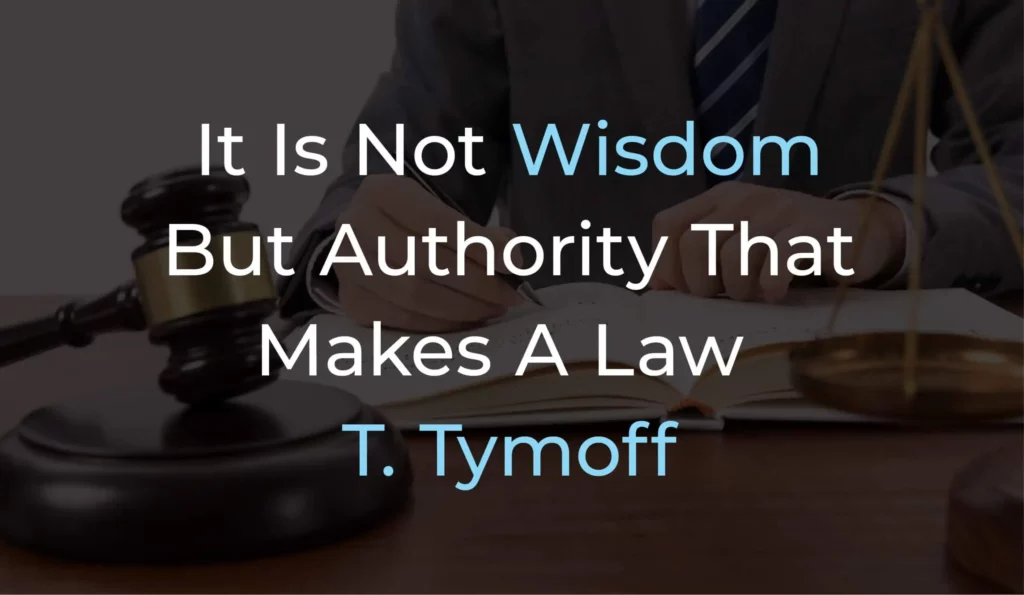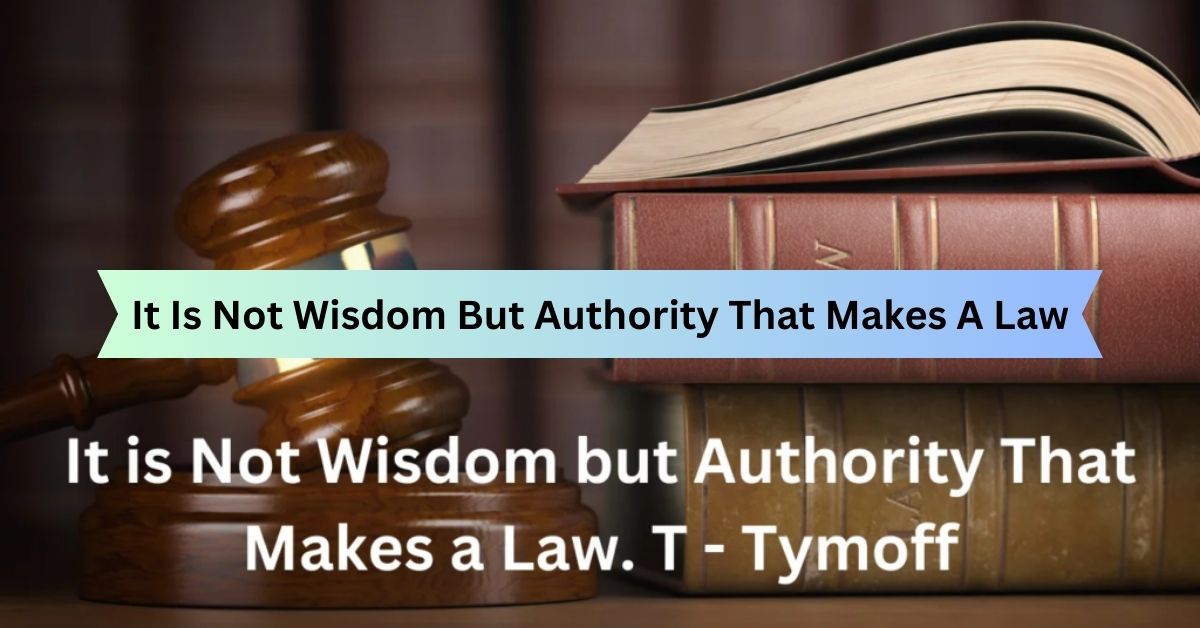It Is Not Wisdom But Authority That Makes A Law. T – Tymoff!
In a world where rules govern our everyday lives, have you ever stopped to wonder what truly shapes the laws we follow?
The saying “It is Not Wisdom but Authority that Makes a Law” by Tymoff opens up a fascinating discussion about the forces at play behind our legal systems. Imagine a scenario where the power to create and enforce laws lies not in wise decision-making but in the hands of those in authority.
It’s a thought-provoking concept that challenges our understanding of how laws are formed and upheld in society. Let’s delve deeper into this idea to uncover its significance and implications for our lives.
When was ‘’It Is Not Wisdom But Authority That Makes A Law. T – Tymoff’ quote first used?

Indeed, the phrase “It is not wisdom but authority that makes a law” has roots dating back to Thomas Hobbes, a prominent philosopher of the 17th century.
Hobbes introduced this concept in his renowned work “Leviathan,” where he delved into the intricate dynamics of sovereignty and governance.
Within this seminal text, Hobbes argued that regardless of their perceived wisdom, the ultimate power to create and enforce laws lies within the hands of sovereign authority, whether that authority manifests as a monarch or a government.
So, This assertion underscores the notion that the ability to dictate and uphold laws often supersedes considerations of moral or ethical wisdom within legal frameworks.
How does wisdom contribute to contemporary lawmaking?
In contemporary lawmaking, wisdom plays a crucial role in shaping legislation that reflects the values and needs of society. Legal experts, advisory panels, and public participation all contribute to the wisdom behind the creation of laws.
Thus, Wisdom helps ensure that laws are just, equitable, and reflective of societal norms and values. It incorporates ethical considerations, societal values, and foresight into the lawmaking process, thereby enhancing its legitimacy and effectiveness.
What are the risks when wisdom is ignored in the drafting of laws?
Ignoring wisdom in the drafting of laws can lead to the passage of unjust or unfair legislation, which may result in social unrest, discontent, and a lack of legitimacy for the legal system.
Laws that disregard wisdom may fail to address the complexities of societal issues or adequately protect the rights and interests of all individuals. Additionally, they may not be effectively enforced or respected by the populace, leading to a breakdown of law and order.
Can Laws Transition From Being Primarily Based On Authority To Being Primarily Based On Wisdom?
Yes, laws can transition from being primarily based on authority to being primarily based on wisdom through various mechanisms.
Citizen participation, expert advice, and ethical considerations can all contribute to a more wisdom-driven approach to lawmaking.
By incorporating these elements into the legislative process, legal systems can evolve towards greater fairness, justice, and legitimacy.
How Does The Balance Between Authority And Wisdom Affect Societal Perceptions Of Justice?

The balance between authority and It Is Not Wisdom But Authority That Makes A Law. T – Tymoff significantly influences societal perceptions of justice.
When laws are perceived as just, fair, and reflective of societal values, it enhances trust and confidence in the legal system.
Conversely, an imbalance between authority and wisdom may lead to skepticism, disenchantment, and perceptions of injustice among the populace.
Therefore, achieving a balance between the two is essential for maintaining the legitimacy and effectiveness of the legal system.
Where can It Is Not Wisdom But Authority That Makes A Law. T – Tymoff be found in the legal system, and who contributes to it?
It Is Not Wisdom But Authority That Makes A Law. T – Tymoff in the legal system can be found in various sources, including legal scholars, lawmakers, judges, and societal values.
These stakeholders contribute their expertise, experience, and ethical considerations to ensure that laws are just and equitable.
Legal experts provide insights into the complexities of legal issues, while lawmakers consider the broader societal implications of legislation.
Judges interpret and apply laws in accordance with established legal principles and societal values, while societal norms and values shape the moral and ethical framework of the legal system.
Does the It Is Not Wisdom But Authority That Makes A Law. T – Tymoff suggest that all laws are solely based on authority?
While the quote emphasizes the role of authority in lawmaking, it does not necessarily imply that all laws lack It Is Not Wisdom But Authority That Makes A Law. T – Tymoff. Instead, it highlights the tension between authority and wisdom and the need for a balance between the two in creating just and equitable laws.
While authority provides the legal framework for laws, wisdom informs their content and application. Therefore, the ideal legal system incorporates both authority and It Is Not Wisdom But Authority That Makes A Law. T – Tymoff to ensure that laws are fair, just, and rflective of societal values.
Historical Examples Support The Assertion Made In The It Is Not Wisdom But Authority That Makes A Law. T – Tymoff:
Throughout history, there have been instances where laws were dictated by authoritarian regimes, emphasizing authority over wisdom.
However, there have also been pivotal moments where It Is Not Wisdom But Authority That Makes A Law. T – Tymoff triumphed over mere authority, leading to reforms and revisions of unjust laws.
For example, movements for civil rights, women’s suffrage, and labor rights have challenged oppressive laws and advocated for more just and equitable legal systems.
These historical examples demonstrate the importance of It Is Not Wisdom But Authority That Makes A Law. T – Tymoff in shaping laws that reflect the values and aspirations of society.
How do modern legal systems incorporate both authority and wisdom in lawmaking?

- Modern legal systems often incorporate both authority and wisdom in lawmaking through democratic processes, public participation, and adherence to ethical principles.
- Elected representatives create laws based on the wisdom of the people, while institutions uphold these laws with their authority.
- Legal experts provide expertise and guidance in drafting legislation, ensuring that it is fair, just, and reflective of societal values.
- Additionally, judicial review ensures that laws are consistent with established legal principles and constitutional rights.
- By incorporating both authority and It Is Not Wisdom But Authority That Makes A Law. T – Tymoff into the lawmaking process, modern legal systems strive to create laws that are legitimate, effective, and responsive to the needs of society.
Faqs:
1. Who wrote it is not wisdom but authority that makes a law?
The phrase is often associated with Thomas Hobbes, a philosopher from the 17th century, who introduced it in his work “Leviathan.”
2. What did Thomas Hobbes mean by it is not wisdom but authority that makes a law?
Hobbes argued that regardless of their wisdom, sovereign authority, like a monarch or government, holds the power to create and enforce laws, as seen in his seminal work on governance, “Leviathan.”
3. What does it is not wisdom but authority that makes a law mean?
This phrase suggests that the power to create and enforce laws lies more with authority figures, like governments or rulers, rather than with wise decision-making. It implies that laws are often based on authority rather than on what is morally or ethically wise.
4. What is the explanation of Thomas Hobbes’ philosophy?
Thomas Hobbes was a philosopher who believed in the importance of a strong central authority to maintain order in society. In his famous work “Leviathan,” Hobbes argued that humans naturally exist in a state of conflict and chaos and that a powerful sovereign authority, such as a government, is necessary to prevent this state of nature from descending into violence and disorder.
Conclusion:
In sum, Tymoff’s idea tells us that authority has more power than wisdom when it comes to making laws. Even though wisdom is important, it’s the authority that makes sure laws are followed. Finding the right balance between authority and wisdom is key for fair and effective laws that benefit everyone. Tymoff’s thought makes us think about how laws are made and enforced, and how we can make them better for everyone.
Also Read:




